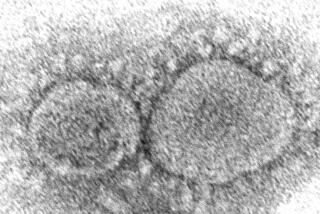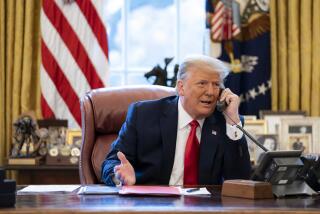House passes patent overhaul
- Share via
Reporting from Washington — The House passed the most sweeping changes to the patent system in nearly 60 years, a rare bipartisan accomplishment pushed by major businesses bent on reducing a huge backlog of applications and aligning U.S. procedures with most of the rest of the world.
The legislation would change long-standing law to grant a patent to the first person to file an application, not to the original inventor. It has become harder to determine and easier to challenge in court who first invented a product or procedure.
The bill also would prevent Congress from diverting millions of dollars in fees collected by the U.S. Patent and Trademark Office to other uses. Supporters hope that provision would help the agency reduce the nearly three years it now takes to process an application. More timely patent approvals, they said, would allow businesses to capitalize on innovations and develop new products more quickly.
The House’s 304-117 vote Thursday followed the Senate’s overwhelming 95-5 passage of similar legislation in March. The two bills now must be reconciled, but there are no major hurdles.
The White House supports the overhaul, which should assure it becomes law in the coming weeks.
The legislation drew support from both sides of the aisle, with 168 House Republicans joining 136 Democrats in voting for passage after lawmakers spent two days working through more than a dozen proposed amendments.
The U.S. Chamber of Commerce and most major companies across various sectors backed the overhaul. They said it would streamline patent processing, thus boosting the nation’s competitiveness and helping create more jobs.
Businesses such as Bristol-Myers Squibb Co., Exxon Mobil Corp., General Electric Co., Microsoft Corp. and Pepsico Inc. were joined by an unlikely alliance of Republicans and Democrats in a complex legislative effort that has lasted six years.
“We need to update our patent system and we need to do it now,” said House Judiciary Committee Chairman Lamar Smith (R-Texas), the lead sponsor. He noted the law was last updated in 1952 in an era of manual typewriters and rotary telephones.
While acknowledging major corporations would benefit, Smith said, “the biggest winners are the American people. They will get more job opportunities and greater choices.”
Patents give exclusive rights to sell or license an invention for 20 years and are vital to large and small businesses.
For example, the U.S. International Trade Commission is weighing whether Apple Inc. and Research in Motion Ltd. infringed on a 2001 patent on digital imaging technology owned by Eastman Kodak Co. If Kodak wins the dispute, it could force Apple and RIM to spend hundreds of millions of dollars to license the technology.
Despite wide agreement that the Patent and Trademark Office needs to reduce its backlog, there was outspoken opposition to the legislation across party lines.
Opponents charged that instituting a “first-to-file” system was unconstitutional and threatened a system that has worked well for more than 220 years to promote U.S. innovation.
The Constitution specifically authorized Congress to secure for inventors the exclusive rights to their discoveries for a limited period of time.
“The bill would permit the Patent and Trademark Office to award a patent to the first person who can win a race to the patent office regardless of who is the actual inventor,” said Rep. John Conyers Jr. (D-Mich.). “That is patently unfair to inventors.”
Opponents included the American Bar Assn., the American Civil Liberties Union and some public interest, small business and conservative groups.
Small inventors would be at a disadvantage to large corporations when it comes to filing patent applications, said Ron Katznelson, president of Bi-Level Technologies of Encinitas, a start-up working on image processing technologies.
Most small companies don’t have the in-house ability to determine if an invention is commercially feasible or to even draw up a patent application, he said. They risk competitors discovering their idea when they seek outside help.
“Large companies have their own internal research and development.... They can make their determinations internally. They don’t have to disclose before they file,” Katznelson said. “We basically would have no choice but to file on every idea before it’s well-developed.”
But supporters of the America Invents Act said it would align U.S. patent law with most other nations and would help reduce a backlog of about 700,000 patent applications awaiting approval.
Since 1992, nearly $1 billion in fees have been diverted from the Patent and Trademark Office to other government spending, starving the agency of money it needs to process applications.
“If it takes 34 months … to get a patent, in many cases the technology that you’re patenting could be obsolete,” said Louis Foreman, chief executive of Enventys, a Charlotte, N.C., company that invents products and helps small inventors license their products. “They’re keeping entrepreneurs on ice.”
More to Read
Inside the business of entertainment
The Wide Shot brings you news, analysis and insights on everything from streaming wars to production — and what it all means for the future.
You may occasionally receive promotional content from the Los Angeles Times.











